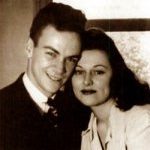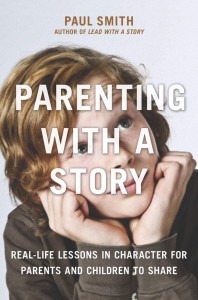Podcast: Play in new window | Download | Embed
Subscribe: RSS
Podcast (parenting-with-a-story-podcast-series): Play in new window | Download | Embed
Subscribe: RSS
 One of the most prevalent human frailties — one that begins in childhood and stays with us the rest of our lives — is a concern about what other people think of us. To a 10-year-old, it might be what the other kids will think of her new tennis shoes. To a teenage boy, it might be what the girls think of his moves on the dance floor. To an adult, it might be what his peers think of his work, or what her boss thinks of her leadership potential.
One of the most prevalent human frailties — one that begins in childhood and stays with us the rest of our lives — is a concern about what other people think of us. To a 10-year-old, it might be what the other kids will think of her new tennis shoes. To a teenage boy, it might be what the girls think of his moves on the dance floor. To an adult, it might be what his peers think of his work, or what her boss thinks of her leadership potential.
That’s a lesson Richard Feynman learned while standing at his wife’s hospital bed.
If you don’t recognize that name, Richard Feynman won the Nobel Prize in physics in 1965 for his work on quantum electrodynamics. In scientific circles, he was known just as much for his sarcastic wit and bongo playing as he was his brilliant science. But, publicly, he was probably best remembered as the guy who solved the mystery of why the Space Shuttle Challenger exploded shortly after liftoff in 1986. Which he did, by the way, by refusing to go along with the investigation plan that NASA had approved and that the U.S. Congress had sent him and 11 other people to conduct.
In fact, it was his unapproved conversations with NASA engineers that helped him figure out that it was a failure in the rubber O-ring on the fuel line that caused the explosion.
 Then, during the congressional panel, on live television, Feynman famously demonstrated his theory by taking one of the O-rings out of his glass of ice water and showing that it didn’t work properly when it was cold. Apparently, the temperature on the morning of takeoff was lower than at any previous shuttle launch. Too cold, as it turns out, for the O-ring to maintain its flexibility, which caused it to fail under pressure.
Then, during the congressional panel, on live television, Feynman famously demonstrated his theory by taking one of the O-rings out of his glass of ice water and showing that it didn’t work properly when it was cold. Apparently, the temperature on the morning of takeoff was lower than at any previous shuttle launch. Too cold, as it turns out, for the O-ring to maintain its flexibility, which caused it to fail under pressure.
Now, was Feynman just born brave? Yeah, probably. But there was at least one defining moment in his life that I’m convinced made him even bolder. And it was the moment that taught him to stop caring so much what other people thought of him.
It was back in the early 1940s. Feynman was one of the scientists working on the Manhattan Project at the Los Alamos National Labs — that was the top-secret government program to build the atomic bomb.
 Now, at the time, Feynman’s wife Arlene was undergoing treatment for tuberculosis in Albuquerque, New Mexico, about a hundred miles away. So, on the weekends, he’d hitchhike to the hospital to visit her.
Now, at the time, Feynman’s wife Arlene was undergoing treatment for tuberculosis in Albuquerque, New Mexico, about a hundred miles away. So, on the weekends, he’d hitchhike to the hospital to visit her.
Well, Arlene knew Richard was frustrated that he couldn’t really do anything to help her. So one weekend when he got there, she showed him an 18-inch charcoal grill she’d ordered through the mail. After all that hospital food, what she really wanted was a home-cooked meal. So she asked him to grill her a steak.
But Feynman said what most people would have said. “How the hell can I grill a steak in the room, here, with all the smoke and everything?”
So, Arlene told him he should just take it out on the lawn in front of the hospital. But the hospital was right on Route 66, one of the busiest highways in the country at the time. And with all the automobile and pedestrian traffic, he said, “I can’t just fire up a grill and start cooking steaks in front of the hospital. People will think I’m crazy!
And that’s when Arlene said something to him that changed everything. She said,
What do you care what other people think?”
That struck a profound chord with him. Not only did he cook Arlene the steak she asked for, he came back and did it again every weekend after that.
After all, why should he care what other people think? He cared about Arlene! Her comfort and happiness was more important than what anyone else thought.
At any age, an unhealthy concern about what other people think about you can stifle your creativity, sap your courage, and keep you from doing what’s really important to you.
So, if you find your young person becoming too worried about what other people think, share this story and ask, “What do you care what other people think?”
As with all of these stories, I encourage you to share this with your kids, and then have a discussion about it. Here are some questions to get you started.
- Do you ever worry about what other people think of you?
- Has that ever stopped you from doing something you wanted
to do? - What’s the worst thing that could happen if you did it anyway?
- What are some situations where it does really matter what other
people think of you?
Use these links to subscribe to this podcast on iTunes or Stitcher, or Podbean.
Source: Parenting with a Story: Real-life Lessons in Character for Parents and Children to Share, by Paul Smith.
—
 Paul Smith is one of the world’s leading experts on business storytelling. He’s a keynote speaker, storytelling coach, and bestselling author of the books Lead with a Story and Parenting with a Story.
Paul Smith is one of the world’s leading experts on business storytelling. He’s a keynote speaker, storytelling coach, and bestselling author of the books Lead with a Story and Parenting with a Story.

 Connect with him via email here.
Connect with him via email here.
Follow him on Facebook, LinkedIn, Twitter.
Sign up for his newsletter here to get one new story a week delivered to your inbox.

